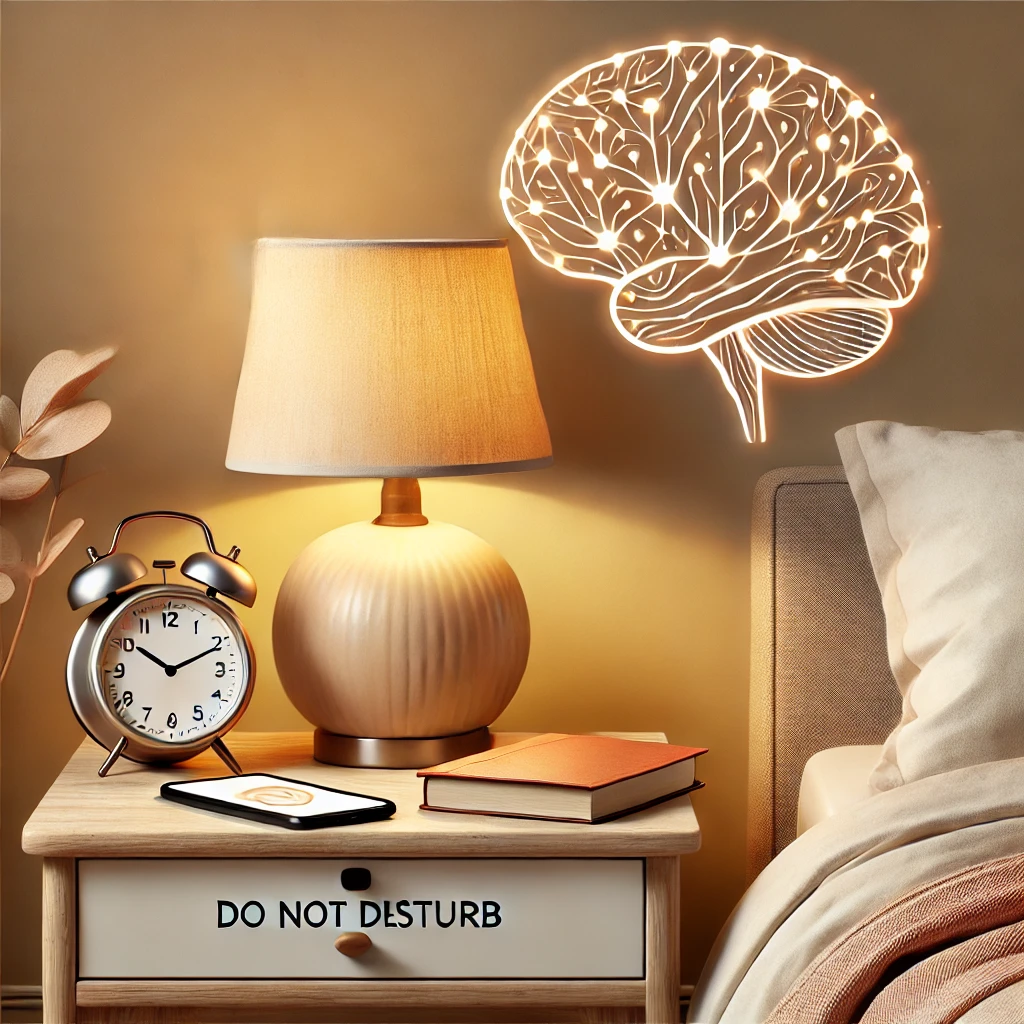Introduction:
Sleep hygiene is a set of practices and behaviors that promote quality sleep and help regulate the circadian cycle – our “biological clock” that controls the rhythm of sleep and wakefulness. Adequate sleep is essential for mental and physical health, and is the basis for a good mood and optimal performance on a daily basis. However, with the intense routine and constant use of electronics, many of us experience problems such as difficulty falling asleep, insomnia and poor sleep quality, which can affect our health on several levels.
Science shows that taking care of sleep hygiene is crucial for regulating hormonal processes, especially those mediated by the pineal gland, which is responsible for producing melatonin, the sleep hormone. In this article, we’ll explore what sleep hygiene is, understand its importance for health and share practical tips for improving the quality of your rest.
Part 1: Straight to the Point 🎯 – Basic Strategies and Practical Actions
Part 1, “Straight to the Point”, offers practical instructions and suggestions for immediate action.

1. Keep a Regular Schedule for Sleeping and Waking Up
One of the most important aspects of sleep hygiene is regularity. Always going to sleep and waking up at the same time helps to synchronize the circadian cycle, promoting deeper and more restful sleep. Even on weekends, try to maintain the routine so that the body gets used to it and the process of falling asleep becomes natural.
This regularity is especially important because it directly influences the release of melatonin by the pineal gland, which is stimulated by the absence of light. The practice of keeping consistent schedules helps to strengthen this hormonal response, allowing for quality sleep.
2. Avoid Bright Lights and Use of Electronics Before Going to Sleep
Exposure to bright light, especially blue light from devices such as cell phones and computers, directly affects melatonin production. Blue light interferes with the circadian rhythm, causing the brain to interpret the environment as “daytime”, which hinders the process of falling asleep. To minimize this effect, avoid electronics at least an hour before bedtime and opt for softer lights at night.
A practical tip is to use apps that adjust the brightness of the screen or the blue light filters available on most devices. This simple change helps the body to better prepare for sleep and allows you to fall asleep more quickly and naturally.
3. Create a Comfortable and Dark Environment
The environment in which you sleep also plays a key role in the quality of your sleep. A quiet, dark room with a mild temperature helps the body feel more relaxed and prepared for rest. Blackout curtains, earplugs or relaxing sounds are alternatives that can help minimize the impact of external stimuli.
Investing in a comfortable mattress and pillow that suits your posture is equally important, as it reduces pain and discomfort, favoring restful sleep. In addition, try to reduce the amount of light in your environment as much as possible, as any extra illumination can interfere with melatonin production and, consequently, the quality of your sleep.
4. Avoid Caffeine and Alcohol in the Hours Before Sleep
Caffeine and alcohol are substances that directly affect the quality of sleep. While caffeine is a stimulant that blocks adenosine, a neurotransmitter responsible for promoting sleep, alcohol may seem relaxing at first, but its metabolization impairs the deep stages of sleep, resulting in an unsatisfactory night’s rest.
Ideally, you should avoid caffeine – found in coffee, dark teas, soft drinks and some foods – for at least six hours before bedtime. Alcohol, on the other hand, should be avoided during the night because, although it helps you fall asleep, it impairs the quality of REM sleep, which is essential for mental and physical recovery.
5. Exercise, but avoid it close to bedtime
Regular physical exercise has a great impact on sleep quality, promoting a better mood and relieving the stress accumulated throughout the day. However, doing intense physical activity too close to bedtime can have the opposite effect, as it increases body temperature and stimulates the nervous system, making it more difficult to fall asleep.
Ideally, exercise should be done in the morning or late afternoon at the latest. Relaxing activities such as stretching or yoga are excellent alternatives for the evening, as they help calm the mind and prepare the body for sleep.
6. Have a Relaxation Routine
Establishing a relaxation routine before bed sends signals to the body that it’s time to slow down. Reading a book, listening to calming music, meditating or practicing breathing exercises are some activities that help you relax. The habit of maintaining a relaxation routine conditions the brain to prepare for sleep, facilitating the process of falling asleep.
Relaxation practices reduce levels of cortisol, the stress hormone, which allows the body to reach a more peaceful state. This practice can be particularly useful for those who find it difficult to “switch off” after an intense day.
7. Avoid long naps during the day
Sleeping during the day can disrupt your night’s sleep, especially if you take long naps. If you need to rest during the day, limit your naps to a maximum of 20-30 minutes and preferably before 3pm. This avoids interfering with the sleep cycle and promotes a more continuous and satisfying night’s rest.
Long naps can disrupt the circadian cycle and interfere with melatonin production, causing the body to take longer to fall into a deep sleep at night.
Part 2: Explaining the Concept Cientificamente👨🏻🔬 -Deepening your knowledge
Part 2, “Explaining the Concept Scientifically”, provides a scientifically-based in-depth look at the “whys” and explains in more detail the suggestions made in Part 1

Science shows that sleep is not just a period of passive rest, but a fundamental process for physical and mental recovery. Quality sleep is responsible for regulating hormones such as melatonin and cortisol, and is directly related to the proper functioning of the circadian cycle and general health. In this section, we’ll explore how sleep hygiene affects the body and what the scientific explanations are for the benefits of adequate sleep.
1. The Circadian Cycle and the Role of the Pineal Gland
The circadian cycle is the 24-hour “biological clock” that controls sleep and wake patterns. This cycle is influenced by natural light and darkness, regulating the production of hormones such as melatonin, produced by the pineal gland. The pineal gland, located in the brain, is stimulated by the absence of light to release melatonin, which helps prepare the body for sleep.
Studies show that excessive exposure to artificial light, especially blue light, negatively affects the circadian cycle and melatonin production, resulting in difficulty falling asleep and a lower quality of sleep. Research published in the Journal of Clinical Endocrinology & Metabolism revealed that artificial light at night significantly reduces melatonin production, delaying the onset of sleep and fragmenting nighttime rest. This reinforces the importance of an evening routine without electronics and with low lights to preserve the natural production of melatonin.
2. The Impact of Sleep Hygiene on Mental Health
Sleep is essential for mental health and plays a fundamental role in memory, learning and emotional balance. During deep sleep, the brain consolidates memories, processes information and eliminates accumulated toxins, which is crucial for maintaining mental health. Sleep hygiene, by promoting a continuous and restorative night’s sleep, helps to reduce levels of cortisol, the stress hormone, and regulate mood.
Studies at Harvard Medical School highlight that a lack of adequate sleep is associated with an increase in symptoms of depression and anxiety, as well as compromising the ability to focus and creativity. Sleep hygiene practices, such as creating a relaxation routine before bed and limiting the use of electronics, help to improve the quality of rest and, consequently, mental health.
3. Sleep and Hormone Regulation: Melatonin and Cortisol
Melatonin and cortisol play a central role in regulating sleep and the stress response. While melatonin is responsible for inducing sleep, cortisol, whose production increases in the morning, prepares the body to wake up and deal with the stresses of everyday life. Poor quality sleep, on the other hand, deregulates these hormones, causing excessive cortisol production during the night, which leads to sleep fragmentation and tiredness on waking.
Increased cortisol levels at night are associated with symptoms of insomnia and difficulty entering the deep stages of sleep, known as REM (rapid eye movement) sleep and NREM (non-REM) sleep, which are essential for physical and mental recovery. A study in the Journal of Sleep Research showed that practicing sleep hygiene, especially by creating a dark and quiet environment, can regulate these hormones and promote more restful sleep.
4. The Benefits of Sleep Hygiene for Physical Health
Quality sleep is also essential for physical health. During sleep, the body works on muscle recovery, strengthens the immune system and regulates metabolism. Practicing good sleep hygiene helps the body to enter the deep stages of sleep, where anabolic hormones are released, such as growth hormone, which is fundamental for tissue recovery and metabolism balance.
Studies show that a lack of adequate sleep can lead to weight gain, insulin resistance and an increased risk of chronic diseases such as diabetes and hypertension. Research published in the American Journal of Physiology has shown that lack of sleep reduces insulin sensitivity, increasing the risk of type 2 diabetes, and compromises immune function, increasing susceptibility to infections.
5. The relationship between sleep hygiene and daily mood
Practicing proper sleep hygiene significantly improves mood and daily performance. Quality sleep allows the body to recover energy and promotes the production of neurotransmitters such as dopamine and serotonin, which are responsible for feelings of well-being and motivation. Science proves that people who sleep well have a better ability to concentrate, a sharper memory and a more balanced mood.
Research by the National Sleep Foundation shows that consistent sleep hygiene contributes to greater energy throughout the day, reducing reaction time and increasing productivity. As a result, the impact of a good night’s sleep is reflected in a better mood and greater efficiency in daily activities.
Conclusion
Adopting a sleep hygiene routine is essential for a healthier and more balanced life. By implementing practices such as avoiding bright lights before bedtime, keeping regular hours and taking care of your sleep environment, you can improve the quality of your rest and promote a better mood on a daily basis. Investing in quality sleep is investing in health, mood and well-being in the long term.
To get started, try the following actions this week:
- Set a fixed time to go to sleep and wake up to regulate your circadian cycle.
- Avoid using electronics an hour before bedtime and adjust the lights in your room to softer ones.
- Create a relaxation routine, such as reading or breathing exercises, to make it easier to fall asleep.

Kelton Tartarotti, a specialist in Health, Longevity and Lifestyle Reprogramming, brings an innovative approach to corporate and personal well-being in the Tartarotti Report. With a comprehensive background in Physical Education, including a BA, BSc and post-graduate studies in the Physiological Basis of Personalized Training and Sports Nutrition, Kelton has a solid foundation in sports and health sciences.
He is registered with the Regional Council of Physical Education (CREF-ES) under number: 005334-G/ES
His experience includes:
International certification as a Personal Trainer by the World Fitness Association (Florida/USA)
Coaching training by ABRACOACH
Specialization in Integrative Functional Health
15 years as a physical trainer for elite MMA athletes in world events
Working as a Physical Trainer at the Espírito Santo Olympic Center (COES)
In the Tartarotti Report, Kelton offers valuable insights into:
Scientifically-based executive health protocols
Stress management and resilience techniques for leaders
Sleep optimization strategies for cognitive performance
Functional nutrition adapted to corporate life
Efficient exercise programs for busy schedules







